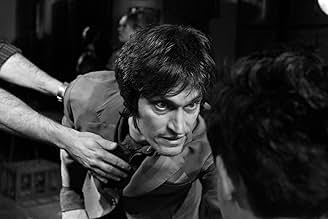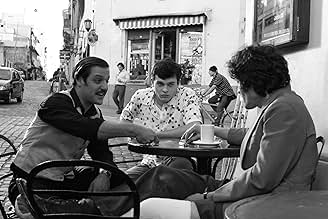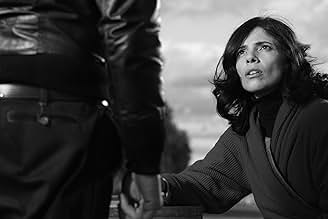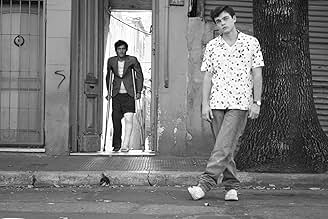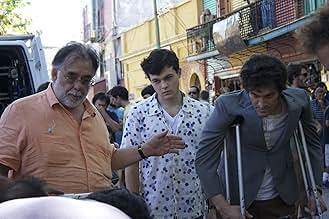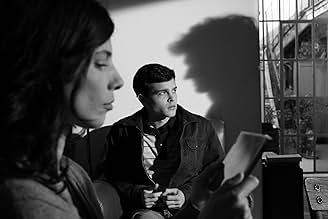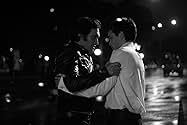Tetro
- 2009
- Tous publics
- 2h 7min
Bennie se rend à Buenos Aires pour retrouver son frère aîné disparu depuis longtemps, un écrivain autrefois prometteur qui n'est plus que l'ombre de lui-même. Il découvre la pièce inachevée ... Tout lireBennie se rend à Buenos Aires pour retrouver son frère aîné disparu depuis longtemps, un écrivain autrefois prometteur qui n'est plus que l'ombre de lui-même. Il découvre la pièce inachevée de son frère, et cela pourrait leur permettre de comprendre leur passé commun et de resser... Tout lireBennie se rend à Buenos Aires pour retrouver son frère aîné disparu depuis longtemps, un écrivain autrefois prometteur qui n'est plus que l'ombre de lui-même. Il découvre la pièce inachevée de son frère, et cela pourrait leur permettre de comprendre leur passé commun et de resserrer leur lien.
- Réalisation
- Scénario
- Casting principal
- Récompenses
- 1 victoire et 6 nominations au total
- José
- (as Rodrigo De La Serna)
- Ana
- (as Érica Rivas)
- María Luisa
- (as Sofía Castiglione)
Avis à la une
This an unsettling and interesting film , an intense drama concerning what past has Tetro left behind , being full of emotion , touching scenes , good feeling , marvellous dances inspired by The Hoffman Tales , The Red shoes by Michael Powell/ Emeric Pressburger and a final twist . It is a simple , dramatic and intelligent portrait of two people , focused on brothership , and sibling rivalry which a dark secret will forever change the family's fate . This is an uplifting movie at times , too , not just a tear-jerker or horrific in showing two sibling's suffering , as they attempt to regain the dignity they lost after years spent without seeing . The picture is developed in slow-moving but is pretty well realized . The flick stands out for its melancholy and poignant multilevel exploration of alienation , past records and despair . The story has a certain melancholic style , a climate of transience and sadness that spread the dispute between the two protagonists brothers . Visually it transports one into a dark, grey , nightmarish world but enriched by some colorful images thanks to some flasblacks well photographed by Mihai Malaimare Jr. , these images were shot in colour , but treated to give a slightly faded texture. The screenplay by Coppola himself , acting, direction all come together to create this extraordinary viewing experience . George Gallo gives a nice acting as the burnt-out Tetro , once-promising writer who is now a remnant of his former self , and he is is hot and cold toward his brother . His sibling is finely played by Alden Ehrenreich at his film debut as Bennie, a waiter on a cruise ship who has a layover in Buenos Aires to meet again his brother and subsequently he finds pages of Tetro's unfinished novel, then he pushes both to know his own history and to become a part of his life . Support cast is pretty good with several Argentina/Spain actors such as Maribel Verdú , Carmen Maura , Rodrigo De la Serna , Silvia Pérez , Erica Rivas , Leticia Brédice and special mention for Klaus Maria Brandauer as father .
The motion picture was compellingly directed by Francis Ford Coppola , though far from his greatest successes . Coppola explained that this one was a very "personal" project , being the kind of film he set out to make as a young man, before he was sidetracked by fame , fortune and sucessful boxoffice. Coppola's film The Godfather (1972) became one of the highest-grossing movies in history and brought him an Oscar for writing the screenplay with Mario Puzo The film was a Best Picture Academy Award-winner, and also brought Coppola a Best Director Oscar nomination. Following his work on the screenplay for The Great Gastby (1974), Coppola's next film was The conversation (1974), which was honored with the Golden Palm Award at the Cannes Film Festival, and brought Coppola Best Picture and Best Original Screenplay Oscar nominations. Also released that year, The Godfather: II (1974) , rivaled the big hit of The Godfather (1972) , and won six Academy Awards, bringing Coppola Academy Awards as a producer, director and writer. Coppola then began work on his most important film, Apocalypse Now (1979), a Vietnam War epic that was inspired by Joseph Conrad . Released in 1979, the acclaimed film won a Golden Palm Award at the Cannes Film Festival, and two Oscars. With George Lucas, Coppola executive produced Kagemusha (1980), directed by Akira Kurosawa, and Mishima (1985), directed by Paul Schrader and based on the life and writings of Yukio Mishima . Coppola also executive produced such films as The Escape Artist (1982) , Hammett (1983) , The Black Stallion Returns (1983), Barfly (1987), The Wind (1992) , The secret garden (1993), among others .
"Tetro" is an artful and somewhat hypnotic adult-oriented drama by the master filmmaker, the very opposite of conventional Hollywood blockbusters. Ehrenreich is reminiscent of Leonardo DiCaprio when he was young while Gallo is broodingly charismatic as the eponymous protagonist. Coppola has always had a good eye for female cast and "Tetro" delivers the goods with Verdú and Gala, although I wish the latter had more screen time. There's a revelation at the end that I failed to anticipate, but should have because everything in the story points to it.
Francis said at the Cannes film festival that "nothing in (the movie) happened, but it's all true." In other words, the film's autobiographical in some ways. The challenge is to perceive the parallels. Two are obvious seeing as how Coppola's father was a famous conductor. The other is when South America's most honored critic asks Tetro if her opinion matters to him anymore and he honestly says it doesn't; sticking her nose in the air, she silently walks away. Like Tetro, Coppola no longer cares what critics think of his works. It's akin to Kurtz' disposition toward the pathetic brass in "Apocalypse Now." The critic's name in the film is fittingly "Alone," played by Carmen Maura. Then there's the fact that Francis has a brother he's been known to have a love/hate relationship with, not to mention how his nephew, Nicolas Cage, is a little reminiscent of the titular character. But none of this speculation really matters; all that matter is that "Tetro" is a creative, operatic, entertaining drama. But stay away if you need constant 'exciting' things going on, like explosions, absurd action scenes and the corresponding CGI (not that there's anything wrong with that, lol).
The film runs 127 minutes and was shot in Buenos Aires & the Andes, Argentina with studio work done in Spain.
GRADE: B
Tetro is, at its core, a film about family, in particular the relationship between brothers and their Father. A theme Francis Ford Coppola has immersed himself in before, most notably in The Godfather and Rumble Fish. Through a series of flashbacks we are given a glimpse of major events in Tetro's youth, his relationship with his father (played by Klaus Brandauer) and his subsequent departure. There are huge family secrets known only to Tetro and revealed to Bennie in an ending which echoes great literary and operatic works. Coppolas love of opera and theater is stamped all over the script and the city of Buenos Aires seems to be the perfect background in which to set this story.
Shot stunningly in digital monochrome with colour flashbacks, it has some aesthetic similarities to Rumble Fish. Coppola and cinematographer Mihai Malaimare Jr. reportedly site On The Waterfront and La Notte as big influences on the films visual style. There are certainly elements of both here, with the film also retaining its visual sense of self. It is operatic in both its narrative and its mise-en-scene. The idea of cutting between colour and monochrome as well as changing aspect ratios sounds as if it would be jarring, and it typically is. But for the purposes of Tetro it works perfectly.
Seen as a controversial choice by some, Vincent Gallo brings an edge to the titular character that some other actors may have lacked. However it is newcomer Alden Ehrenreich who steals the show as Bennie, a wayward teenager looking for guidance and approval. Maribel Verdu, as Miranda, provides the conduit between the two in a typicaly solid performance.
Hollywood is littered with once great directors who have fallen from grace, which makes Tetro all the more remarkable as a return to form from one of the greatest, Francis Ford Coppola.
Tetro is about family, a subject Coppola is, of course, well-versed in being it the notorious kind (of course, the Godfather) and the more low-level and oddly intimate (Rumble Fish). It's a story, as with Rumble Fish, told in crisp black and white widescreen with flashes of color for flashbacks which may or may not be real, and as homage to operas like The Tales of Hoffmann. The title character, wonderfully and intensely portrayed by Vincent Gallo, is in a creative exile in Buenos Aires, a once promising writer living with his doctor-wife (Maribel Verdu, great as always) who is paid a visit one day by a young man, his brother Bennie (baby-faced newcomer Alden Ehrenreich) who hasn't seen him in years. There's secrets withheld by Tetro, not least of which about their parents, and soon an unfinished, longhand written play by Tetro (real name Angelo) is discovered by Bennie in a suitcase. He'll finish his brother's play, but at what cost?
The damaged, almost bi-polar writer, the insistent and impressionable brother, the strong but uncertain woman, these characters are fully realized by Coppola, and then on top of this comes a sort of terrific puzzle that is constructed through Tetro's unfinished play: what about their father, a famous composer (Klaus Maria Brandeur) who split them apart, possibly, or possibly not? What about their mother, who died in a car accident? What about the bond between Tetro and his former mentor, "Alone", the dubbed "most important critic in South America" who has created a pretentious empire around herself? Questions arise, and Coppola rises to the challenge of giving the audience answers but not spoon-fed. It's first and foremost a story of family, of brothers who love but have to find ways to contend with their damaged selves(inspiration being Rocco and His Brothers mayhap), and it's here that it's just about classic, on par with Rumble Fish if not even deeper and wiser about the effect of parents, or lack thereof, in lives spent and possibly wasted.
The writing is immensely interesting, always, even when Coppola may fall into over-indulging in his fantastic self-indulgence as an artist, such as with the operatic flourishes towards the end (this may not make sense, but compared to the WAY over indulgence of the hard-to-defend Y. W. Y it will). If anything the little imperfections, those brush strokes that go so high with the colors and shadows and impressionistic lighting that he and DP Mihai Malaimaire Jr engage in (one who hopefully will be getting more work following such spectacular work on a mix of 35mm and HD) along with Walter Murch's dependable editing, make it an even stronger work. It should feel a little messy here and there, because its subject matter is about finding a sense of purpose, in each other and in one's art. One feels Coppola working through a history of close but torn family ties, of losing loved ones (i.e. His own son), and at the same time a love of them all and of cinema peeking through in nearly every scene, even the ones where it doesn't look like much is going on.
Tetro is the antidote, basically, for this month's Transformers sequel. If you need to find the polar opposite of a picture based practically on just making money and reeling in the crowds with its dumb giant robot battles and preposterous and shallow theatrics, look no further than a picture which cares about its characters, its multi-faceted story and themes, and about projecting a technique that hearkens back to cinema of the 50s and 60s while sticking to an originality by its filmmaker. This will likely stay with me for a while, which is what Coppola's most profound works have done.
Simply put, "Tetro" is Francis Ford Coppola's reinvention back into "quality" cinema and a perfect example of the wonder that can be achieved when a Director is in control of practically all creative aspects of his work. Don't be mistaken, if you're looking for the Coppola from the 70's, he's long gone. This new Coppola has been reborn, emerging as someone quite different. Funded entirely through revenue from his private vineyard, he's created one of the most stylistically atmospheric black and white films that I've seen in recent memory. One can't help but feel that there are heavy influences by the great Italian filmmaker Federico Fellini throughout, especially through the incorporation of operatic high drama and scenes that feel all too autobiographic to be dismissed as pure coincidence. In addition, there is a subtle Noir accent which is credited to Mihai Malaimare's gorgeous cinematography. Coppola is now, a true Indy, non-conformist filmmaker and my gut tells me that he really doesn't care. Instead, he doesn't give it all away, but rather does an exceptional job of keeping the motives, feelings and details about his characters well hidden for the longest possible duration of time until it is inevitable for such crucial facts to be revealed solely to aid the plot.
Mainstream audiences may just come to hate Tetro. It has an overall "artsy" coat to it that many of today's average moviegoers may not be able to get past. This includes extended, sporadically placed dance sequences from Powell and Pressburger's celluloid Opera "The Tales of Hoffmann" as well as original ballet numbers which are used to convey character emotions and cleverly emphasis certain themes. That said, foreign film aficionados, especially those of such Directors as Giuseppe Tornatore or Michael Radford, will be delighted with Coppola's knowledge of the Genre and passionate homage to those who have coined it. Through the script, he is precise and very careful with what he chooses to include as well as place importance on. With many scenes purely dialogue driven, he is a master of building tension without having to rely on the support of quick cutting, action or special effects to drive home his points.
Actor Vincent Gallo, in one of his first non-self Directed/self written films, fits comfortably into the role of Tetro. His narcissism (which I believe is in fact also grounded in his real life) brings life to the part and he's believable straight up to the films shocking conclusion. There is a certain vulnerability and a hurt that Gallo also manages to convey which is really what makes Tetro such an interesting character to watch on screen. Newcomer Alden Ehrenreich has a look matched by the likes of Leonardo DeCaprio, and certainly has the acting chops to pull it off. There is a definite star appeal about him that seems to emanate naturally which will certainly cause him to gain more roles and credibility as a performer in the future. Mirabel Verdu is absolutely stunning as Miranda and gives off a "Sophia Loren" type elegance, a role that rounds out the feeling that what we're experiencing is in part truly a charming foreign film coming out of what was once a mainstream filmmakers body.
Tetro is a testament to the fact that an artist can pick himself up over the course of decades and learn from his failures as well as his successes. Francis Ford Coppola's recent work is bold, daring and symbolizes his true love for the medium. At its heart you can see that the characters, story and attention to even the most minor of details are shown so much love and care that they could only be executed by a passionate and dedicated creative mind. My only regret after seeing Tetro is that more people will turn down the opportunity to open their eyes and experience it for themselves.
Le saviez-vous
- AnecdotesFrancis Ford Coppola claimed that this is the kind of film he set out to make as a young man, before he was sidetracked by fame and fortune.
- GaffesEarly in the movie Tetro stumbles into the kitchen with a broken leg and knocks over some furniture while lighting a cigarette using a burner on the stove. he ignites the burner by just turning the knob on the stove. A few minutes later Miranda must use a match to light a burner on the same stove-top.
- ConnexionsFeatured in At the Movies: Cannes Film Festival 2009 (2009)
- Bandes originalesEl Búho
(2007) (uncredited)
Written & Performed by Lisandro Aristimuño
Courtesy of Los Años Luz Discos SRL
Meilleurs choix
- How long is Tetro?Alimenté par Alexa
Détails
- Date de sortie
- Pays d’origine
- Langues
- Aussi connu sous le nom de
- Francis Ford Coppola's Tetro
- Lieux de tournage
- Sociétés de production
- Voir plus de crédits d'entreprise sur IMDbPro
Box-office
- Budget
- 5 000 000 $US (estimé)
- Montant brut aux États-Unis et au Canada
- 518 522 $US
- Week-end de sortie aux États-Unis et au Canada
- 30 504 $US
- 14 juin 2009
- Montant brut mondial
- 2 874 474 $US
- Durée
- 2h 7min(127 min)
- Couleur
- Mixage
- Rapport de forme
- 2.35 : 1







